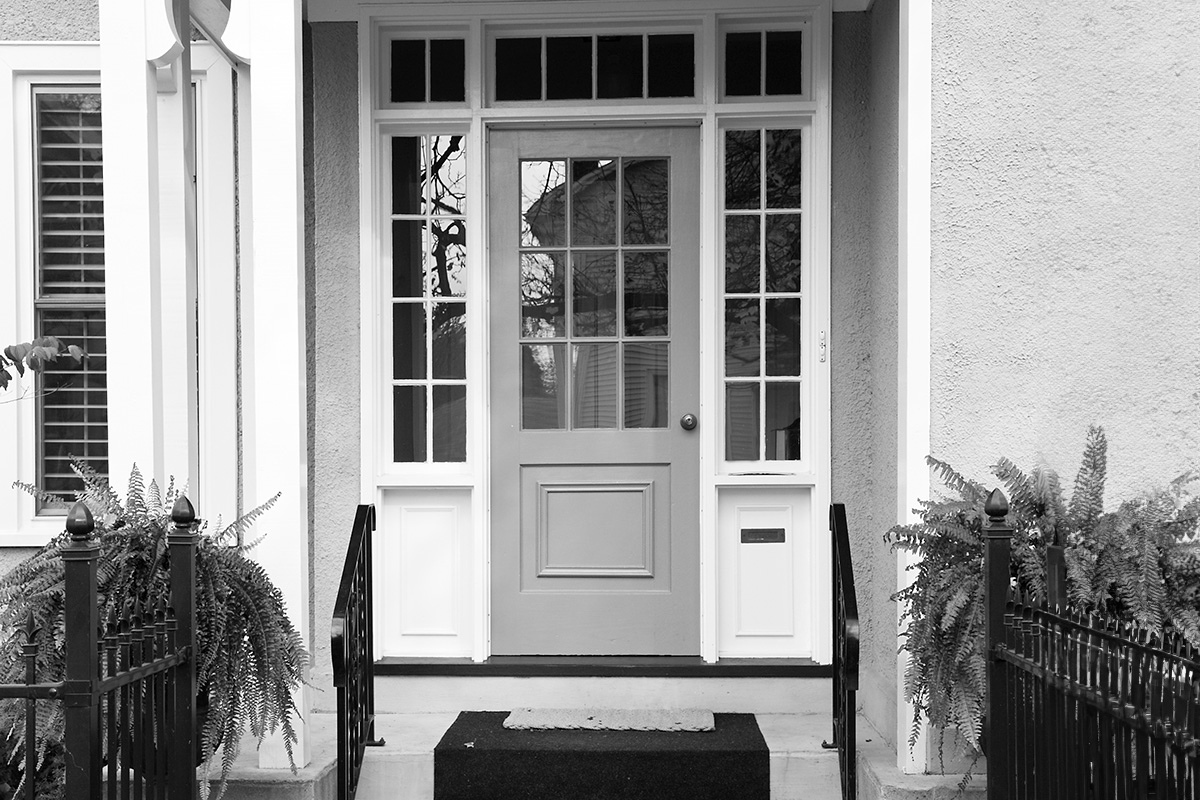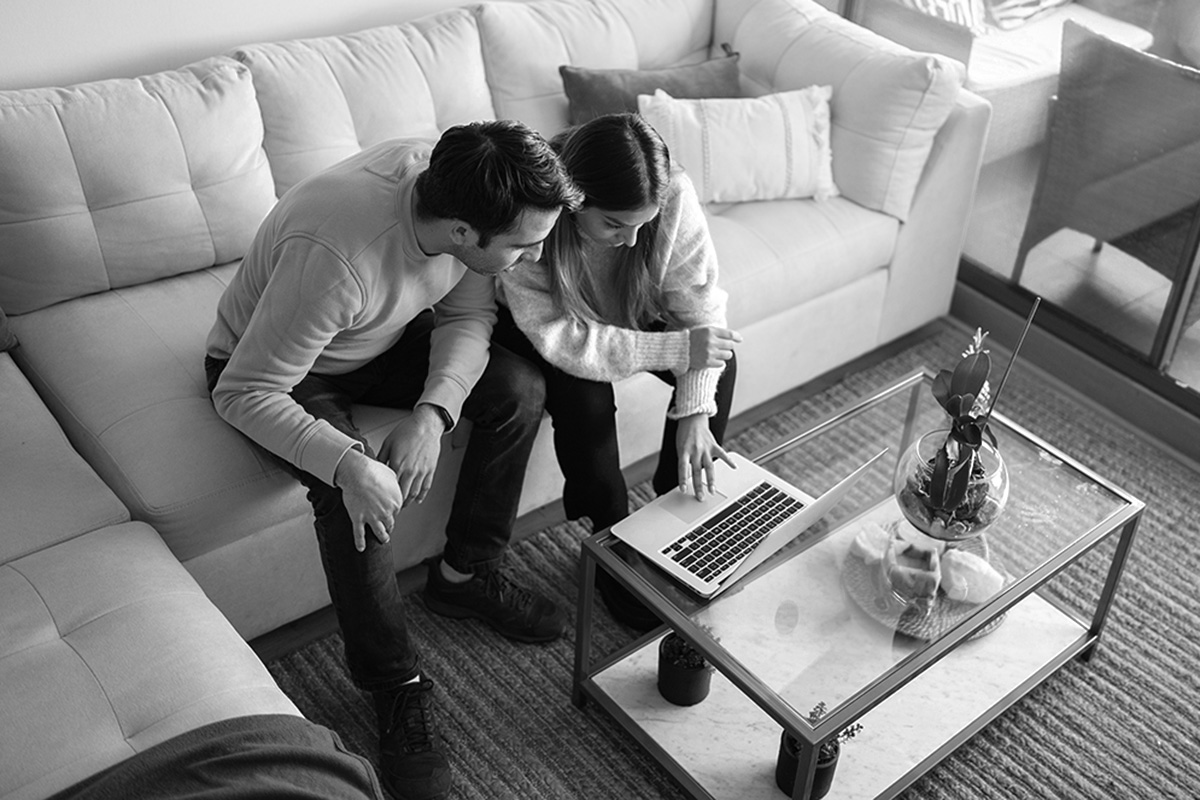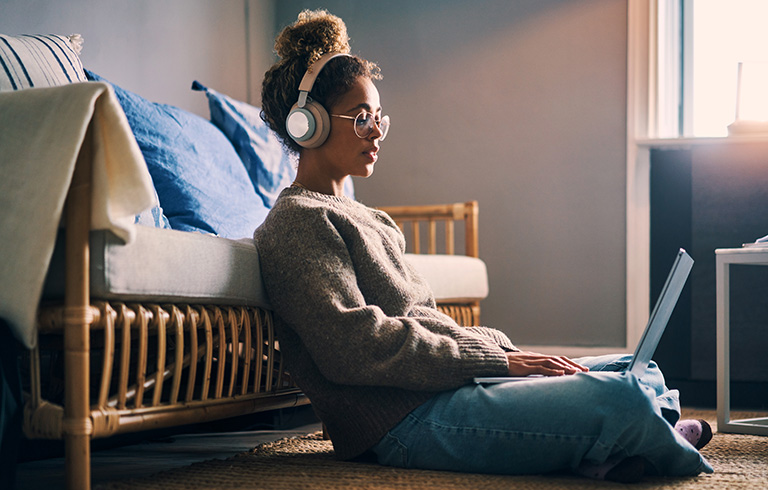
A Homebuying Guide for 18 to 25-Year-Olds
How Old Do You Have to Be to Buy a House?
A Homebuying Guide for 18 to 25-Year-Olds
As someone in their late teens and early twenties, you may not have given much thought to buying a house. You probably see yourself doing it down the line once you're established in your job and ready to start a family.
You may have also heard that buying is often better than renting and wondered if there's some merit to that. If you have a steady job and pay rent each month, it may be time to consider taking the leap to buy a home.
Buying a home is one of the biggest purchase decisions you'll ever make, and you’ll likely have a lot of questions, like whether you're old enough to buy a home or if it's a good financial decision at your age. This homebuying guide will help you figure out if you're ready to buy a house and what you'll need to do once it’s time to take the plunge.


Before buying
There's a lot of careful consideration that goes into buying your first home. Follow these steps to decide if you're truly ready.
When can you legally purchase a home?
In almost every state, 18 is the age of majority. At age 18, people can make legal decisions on their own behalf, including purchasing a home. Only three states have a different age of majority: Alabama (19), Nebraska (19) and Mississippi (21).
It's important to remember, though, that just because you're old enough to do something legally doesn't mean that it's the responsible thing to do.
Why you should buy a home while you're young
There are quite a few reasons to buy a house while you're young. If you're able to pay the mortgage in a good market, it can be a solid investment. Many people compare paying rent to throwing money away, while paying a mortgage is an investment that is likely to grow with time.
You have plenty of time to build equity in your home. If you decide to sell several years down the road, you should make money from the sale (depending on the market at that time). This equity can then be used as a down payment for your next house or for another investment. Many people buy and sell houses this way for ten or twenty years until they can finally pay for a home in cash.
If you're currently renting, you understand what it means to be subject to a landlord. Your rent can be raised, or you can be evicted if the landlord decides to do something else with the property. Customizations or renovations are usually not allowed, so it’s more difficult to make the home or apartment feel like your own.
For most young people, it can take years to build up their credit score. Getting a mortgage can help you build your credit faster, as long as you make your payments on time and keep up with all your other financial obligations.
There are some tax benefits to owning a home, too. Claiming the interest you pay on your mortgage—and sometimes your property tax—may help you maximize your refund. You can't claim anything on the rent you pay.


Why you shouldn't buy a home while you're young
When you're young, there can be just as many reasons not to buy a house as there are to buy one. It’s important to consider both sides thoroughly.
While you may not need to put down enough for a conventional loan to avoid mortgage insurance (20% or more), you'll likely need some sort of down payment. FHA loans require at least 3.5% but also come with the added cost of mortgage insurance. Or you may want to look into a first-time homebuyer program which can include down payments as little as $1,000.
If you haven't had time to build up your savings, you may not want to buy a house if it means you’ll max out everything you've saved. It may make more sense to wait until you can afford a bigger down payment. Typically, the more you can save, the better.
If you're just getting started in your career, you're likely making an entry-level salary. This income may not be enough to cover the cost of your mortgage payment and other expenses. Your budget will need to adjust to cover costs such as additional utilities, furnishings, appliances or other home supplies.
Renting isn't always the best, but at least when something goes wrong, you can call your landlord and get it fixed. When you own a house, the problems are all yours. You're responsible for any repairs, which can be both costly and time-consuming—especially in an older home.
You'll also have to maintain the yard and keep the outside looking nice. If you live in an area with a Homeowners Association (HOA) or other urban areas, you'll likely be required to keep your yard and house to a certain standard or risk facing a fine.
Buying a house means you’re stuck in one place for at least a little while. Most rental contracts end in six months to a year, but to recoup the money you spend buying a house, you will probably need to stay for at least a few years.
When you're young, it's easier to be spontaneous—pick up and move somewhere else on a whim or try out a new job. You may not be able to do these things if you're tied to a house.
Is it the right time for you to buy a house?
Knowing the pros and cons of buying a house at a young age is only part of the story. Not only do you need to understand what you're getting into, but you also need to figure out if you're in the right situation to buy a home.
Signs that you’re ready to buy a house
You’re earning a dependable income
The most important thing is that you can afford to pay for your house. Make sure you have job security—if you've been working at your job for at least two years, you should consider yourself stable.
Ensure that you're making enough each month to cover the cost of your mortgage, utilities and other financial obligations. You'll also need to ensure you have enough savings to cover you for a few months in case of an emergency and that there’s some money left over for necessities and fun stuff too.
According to Money Under 30, your mortgage (which includes taxes and insurance), should account for less than 28% of your monthly income. If you can get a mortgage with a monthly payment at or below this number, then you may be financially ready for a house.
You have good credit
Getting a mortgage is different than getting a credit card or even a new car. You will need a credit score —usually 620 or higher—to qualify. The higher your credit score, the better your interest rate will be.
You've saved enough for a down payment
In many cases, it’s necessary to have at least 3.5% of the home's asking price for a down payment. While 3.5% is a minimum, it's always better if you can put down more. You'll lower the total amount of your mortgage which means a lower monthly payment and less interest paid over the life of the loan.
You have emergency savings
There are a lot of different theories about how much you need in emergency savings. We recommend a starting point of at least $1,000 with the goal of building to three to six months’ worth of expenses in your savings. With this amount, you have a better chance of being covered—even if the worst happens.
You're ready to put down roots
If you’ve found a job you love in a town you enjoy living in, it’s a good sign it’s time to buy a house. Buying a house means making a commitment to an area, so make sure you’ve found a place where you want to live for an extended amount of time.
Signs to wait on buying a house
You don't earn enough or your income isn't stable
Just because you qualify for a mortgage doesn't mean you're financially ready to buy a home. If your budget is too tight each month, then you may run into trouble. It's better to wait and shore up your income than to buy one before you're ready to keep up with the commitment of a steady mortgage payment.
You have too much debt
If you owe a lot of money—whether on credit cards, a vehicle or student loans—it's probably better to wait before taking on a mortgage. Lenders will compare your debt-to-income ratio (DTI), which is basically what you owe compared to what you make, and if it's above 47%, you may not qualify for a mortgage.
You have a low credit score
To qualify for a mortgage, your credit score should be in the good to excellent range (660 or above). While there are programs to help people with low credit scores purchase a home, you may be required to have a larger down payment or pay a higher interest rate. It may be better to wait until you’re able to increase your credit score.
The real estate market is stagnated
If you live in an area where the real estate market isn't growing, buying a house won't be much of an investment. You could even lose money if the home values have decreased in value when you want to sell.
What to do before you buy
If you've decided that buying a home makes sense for you, the process involves more than just looking at a few houses, making an offer and moving in.
Here's everything you should do before you begin the buying process:
Create a budget
Make a list of all of your expenses and financial obligations and see how much you can reasonably afford for a monthly mortgage payment. Be sure to account for incidentals, emergencies and fun money. Leave yourself some wiggle room, as you don't want to be stretched so thin that you can’t afford any variations in your monthly expenses.
Pay off debt
Try to pay off as much debt as you can before you apply for a mortgage. You may not be able to pay off big notes, like your car or student loans, but try to take care of smaller bills and as much credit card debt as possible
Build up your savings
Try this proven savings method: set up a separate savings account and name it “Dream house” or “Down payment.” Knowing what you’re saving for makes it easier to sacrifice as you watch your nest egg grow.

During the buying process
Once you've gotten everything in place, it's time to start the actual process of buying a home.
Get preapproved for a mortgage
Before you start looking at homes, get a preapproval letter from your financial institution. This letter states how much you've been approved for. While it's not required to make an offer on a house, an offer that’s accompanied with an approval letter is more attractive to most sellers.
During the application process, the lender will require you to show proof of income, bank records, tax returns and a list of your debt and assets. The lender will pull your credit report, which may drop your score by just a few points. You'll have anywhere from 14–45 days after this to have your credit pulled again with no additional effect on your credit score. This makes it easy to shop around with a few lenders to get the best rates.
What can you afford?
Your preapproval letter will tell you how much money you've been approved to borrow. The preapproval lasts for 30 days, and rate lock-ins typically range from 30 to 60 days. If you don't find a home during this time period, you'll have to get a new letter with current rates.
Keep in mind as well that your preapproval amount may not necessarily match the amount you are comfortable with based on your budget. Make sure your realtor knows what range you want to stay in while looking at houses.
Make a list of your wants and needs
Before beginning your home search, you need a clear idea of what you want. Start with your needs. What are the dealbreakers? How many bedrooms and bathrooms do you need? Do you need a large kitchen or an outdoor space for entertaining? What about the garage size?
Once you have your needs, make a list of wants. Unless you have an unlimited amount of money, you'll probably have to compromise on some of your wants (and maybe some of your needs). Use your lists of needs and wants to help you narrow in on the properties you’re most interested in.
Starter home or forever home?
You likely have an image in your mind of what your forever home will look like. Even when buying young, you're probably trying to get something close to your dream home, but that may not be the best option. According to the National Association of Realtors®, about one-third of millennials are waiting until age 31-37 to buy their forever home.
Unless your income is high, you're likely better off buying a starter home. Starter homes are smaller and may not have all the high-end features, but they're also more affordable. You can live there for three to five years, save money and build up equity. Then, when you sell, you'll have a good amount of money to make a down payment on your forever home.
Should you work with a realtor?
There's no reason you shouldn't work with a realtor. A realtor’s knowledge of the area where you're looking can be vital to finding homes in your price range with the features you want.
An agent can also give you valuable advice like whether a home is worth the asking price and what you should offer. Realtors may know about properties that the public doesn't have access to yet and, in the case of a hot market, can help you move quickly on new listings and negotiate effectively.
Making an offer
There are a few steps to making an offer. First, consult with your agent and decide if you need to offer the full asking price or if you can come in below. If there are other offers, you'll have to wait to see if your offer is accepted. There can even be a bidding war if more than one buyer is interested in the property.
Be sure to include some contingencies in your offer. It’s a common practice to make your offer contingent upon an inspection. If there are issues, you may request an allowance to make repairs. Be prepared to put down some earnest money to show you're serious about buying the house.
Get homeowners insurance
You'll need to shop around with a few insurance agencies to get a homeowners policy. Your insurance agent can go over the details of your policy with you and make sure you're covered for anything that may come up.
The closing
The closing is the final hurdle to jump through before you get the keys to your new home. You and the seller will sign the legal documents transferring ownership from the previous owner to you.
You may be required to bring proof of insurance and inspection. The down payment will also be required at this time. Your realtor or closing agent from the title company will give you the amount needed at closing, which will include your down payment as well as several other fees. Once everything is completed, you'll be handed the keys to your new home.
After your purchase
Once the purchase is finalized, it's time for the fun part—moving into your new house!
In addition to getting all your things packed up and transported, here’s a list of things to keep you organized during the moving process:

Set up utilities
You'll need to set up accounts with each of the utility companies to have everything hooked up. You'll need:
- electricity
- water
- sewage
- internet
- cable
- gas
Don't forget to change your address and have your mail forwarded.
Get the house ready
Depending on the state of your new house, you may need to do some repairs or renovations. If you can get all of that done before moving in, it'll be much easier. You may also want to do a deep clean, especially if the house is older.
Final thoughts
Buying a house when you’re between the ages of 18 and 25 isn't for everyone. It's a long process and if your finances aren't ready, buying a house could result in even more trouble.
However, if you’re ready to buy a house, you have the potential to make a great investment in your future. For each month that you pay on a mortgage, you're building equity in your home. If you can stay in your house for several years, you could be able to make a nice profit and be that much better off when it's time to move up to your next house.
Ready to apply for a mortgage?
Our mortgage experts are always ready and willing to assist you in your home purchse journey. Schedule a meeting with a loan officer or call 1-800-277-7703.
Apply onlineSchedule an appointment